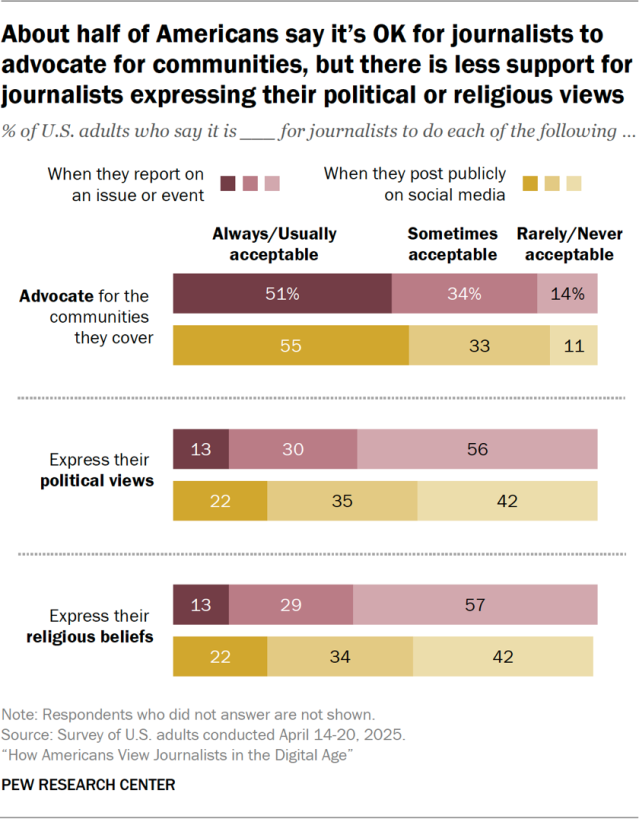☀️ Happy Thursday! The Briefing is your guide to the world of news and information. Sign up here!
In today’s email:
- Featured story: Murdoch family settles future control of media empire
- In other news: Charlie Kirk’s impact on conservative media
- Looking ahead: Anthropic agrees to $1.5 billion copyright settlement later paused by judge
- Chart of the week: Is it acceptable for journalists to advocate?
🔥 Featured story
Lachlan Murdoch, eldest son of Rupert Murdoch, will maintain corporate control of the family’s media empire in the coming decades, according to a settlement reached by the family this week. Its properties include Fox News, The Wall Street Journal and the New York Post, among other media outlets in the U.S. and around the world.
The announcement ends a long-running dispute over how the Murdoch family would divide control, during which the 94-year-old Rupert Murdoch reportedly sought to cement the conservative political orientation of many of his outlets through Lachlan. Three of Rupert’s other children – James Murdoch, Elisabeth Murdoch and Prudence MacLeod – are each expected to receive about $1.1 billion in the deal.
While Republicans are much more likely than Democrats to get news from Fox News, that is not the case for The Wall Street Journal and the New York Post, according to a March 2025 Pew Research Center survey. For instance, 16% of Democrats say they regularly get news from the Journal, compared with 12% of Republicans. And Democrats are also more likely than Republicans to say they trust the Journal as a source of news (37% vs. 23%).
📌 In other news
- After Charlie Kirk was shot and killed Wednesday, a look at his impact on conservative media
- CBS News hires former head of conservative think tank as new ombudsman
- The New York Times launches family subscriptions
- Will Lewis, now publisher of The Washington Post, advised Boris Johnson when he was UK PM
- Univision warns viewers that YouTube TV may pull the broadcaster from its basic bundle
- Florida radio station rebrands itself as “Trump Country”
- NPR names new editor in chief
📅 Looking ahead
Last week, Anthropic agreed to pay a $1.5 billion settlement in a class action lawsuit brought by authors accusing the AI firm of training its models on copyrighted books. But then a judge raised concerns about the settlement and put the deal on hold.
Many Americans in a February 2024 survey (54%) said AI programs that generate text and images need to credit their sources. A much smaller share (14%) said such programs don’t need to credit sources. About a third (32%) were not sure.
📊 Chart of the week
This week’s chart comes from our recent report on how Americans view journalists in the digital age.
Most Americans say it is at least sometimes acceptable for journalists to advocate for the communities they cover when reporting on an issue or event, including 51% who say this is always or usually acceptable. At the same time, more than half say it is rarely or never acceptable for journalists to publicly express their political or religious views in their reporting.

👋 That’s all for this week.
The Briefing is compiled by Pew Research Center staff, including Naomi Forman-Katz, Jacob Liedke, Christopher St. Aubin, Luxuan Wang, Emily Tomasik and Joanne Haner. It is edited by Michael Lipka and copy edited by Anna Jackson.
Do you like this newsletter? Email us at info@pewresearch.org or fill out this two-question survey to tell us what you think.